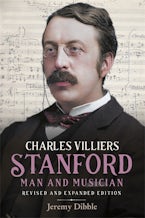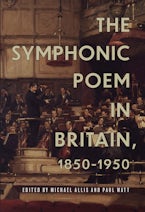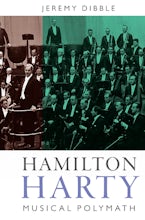
The Music of Frederick Delius
Style, Form and Ethos
- Description
- Contents
- Author
- Reviews
This book examines Delius's individual approaches to genre, form, harmony, orchestration and literary texts which gave the composer's musical style such a unique voice.
Frederick Delius' (1862-1934) music has proved impervious to analytical definition. Delius's approaches to genre, form, harmony, orchestration and literary texts are all highly individual, not to say eccentric in their deliberate aim to avoid conformity. Rarely does Delius follow a conventional line, and though one can readily point to important influences, the larger Gestalt of each work has a syntax and coherence for which conventional analytical methods are mostly inadequate. Delius's musical style has also defied one of the most essential critical tools of his musical epoque - that of national identity. His style bears no relation either to the Victorian or Edwardian aesthetic of British music spearheaded by Parry, Stanford and Elgar before the First World War, nor to the more overtly nationalist, folk-song-orientated pastoralism of post-war Britain in such composers as Vaughan Williams and Holst. In contrast, Delius acknowledged himself a 'stateless' individual and considered that his music refused to belong to any national school or movement.
To test these claims, the book explores a number of important factors. Delius's musical education at the Leipzig Conservatorium and the works he produced there. Delius's musical voice, notably his harmonic and melodic style and the close structural relationship between these two factors. The book also explores the question of Delius and 'genre' in which the investigation of form is central, especially in opera, the symphonic poem, the choral work (where words are seminal to the creation of structural design) and the sonata and concerto (to which Delius brought his own individual solution). Other significant factors are Delius's cosmopolitan use of texts, operatic plots and picturesque impressions, his relationship to Nietzsche's writings and the genre of dance, and the role of his 'earlier' works (1888-1896) in which it is possible to plot a course of stylistic change with reference to the influences of Grieg, Sinding, Florent Schmitt, Wagner, Strauss and Debussy.
Frederick Delius' (1862-1934) music has proved impervious to analytical definition. Delius's approaches to genre, form, harmony, orchestration and literary texts are all highly individual, not to say eccentric in their deliberate aim to avoid conformity. Rarely does Delius follow a conventional line, and though one can readily point to important influences, the larger Gestalt of each work has a syntax and coherence for which conventional analytical methods are mostly inadequate. Delius's musical style has also defied one of the most essential critical tools of his musical epoque - that of national identity. His style bears no relation either to the Victorian or Edwardian aesthetic of British music spearheaded by Parry, Stanford and Elgar before the First World War, nor to the more overtly nationalist, folk-song-orientated pastoralism of post-war Britain in such composers as Vaughan Williams and Holst. In contrast, Delius acknowledged himself a 'stateless' individual and considered that his music refused to belong to any national school or movement.
To test these claims, the book explores a number of important factors. Delius's musical education at the Leipzig Conservatorium and the works he produced there. Delius's musical voice, notably his harmonic and melodic style and the close structural relationship between these two factors. The book also explores the question of Delius and 'genre' in which the investigation of form is central, especially in opera, the symphonic poem, the choral work (where words are seminal to the creation of structural design) and the sonata and concerto (to which Delius brought his own individual solution). Other significant factors are Delius's cosmopolitan use of texts, operatic plots and picturesque impressions, his relationship to Nietzsche's writings and the genre of dance, and the role of his 'earlier' works (1888-1896) in which it is possible to plot a course of stylistic change with reference to the influences of Grieg, Sinding, Florent Schmitt, Wagner, Strauss and Debussy.
PART 1 THE SEEDS OF COSMOPOLITANISM
1 An unconventional apprenticeship: Bradford, Florida and Leipzig (1862-1888)
2 Creative self-communion: Paa Vidderne, Lieder aus dem Norwegischen, Légendes, Drei Symphonische Dichtungen, Songs (1888-1891)
3 A Wagnerian odyssey: Irmelin and The Magic Fountain (1891-1895)
4 A stylistic fulcrum: Koanga, the Danish Songs, the Piano Concerto and Folkeraadet (1895-1897)
5 A Nietzschean 'dance' epiphany: Nieztsche Songs, Mitternachtslied Zarathustras, Paris, La Ronde se déroule, Lebenstanz (1898-1901)
PART 2 THE VOICE OF INDIVIDUALITY
6 Operatic innovation: Romeo und Juliet auf dem Dorfe and Margot le Rouge (1898-1902)
7 American apogee: Appalachia (1902) and Sea Drift (1902-3)
8 The Nietzschean obsession: A Mass of Life (1904-6)
9 'English' interlude: the partsong as innovative genre: Songs of Sunset, 'On Craig Ddu', 'Wanderer's Song', 'Midsummer Song', 'To be sung of a summer night on the river' (1906-8)
10 The symphonic poem (I): Brigg Fair, In a Summer Garden, Dance Rhapsody No. 1 (1907-1912)
11 Homage to Jacobsen: Fennimore and Gerda, An Arabesque (1908-1913)
PART 3 FAME AND DECLINE
12 Symphonic poem (II): Two Pieces for Small Orchestra, Song of the High Hills, North Country Sketches (1911-1914)
13 Music of the war years and after (I): Dance Rhapsody No. 2, Requiem, Eventyr, A Song Before Sunrise, Poem of Life and Love, Hassan
14 Music of the war years and after (II): Sonatas and Concertos: A Stylistic Paradox: Violin Sonata No. 1, Double Concerto, Cello Sonata, String Quartet, Violin Concerto, Cello Concerto, Violin Sonata No. 2 (1914-1923)
15 The last years of creativity: Song of Summer, A Late Lark, Cynara, Violin Sonata No. 3, Songs of Farewell, Irmelin Prelude, Fantastic Dance, Idyll (1923-1934)
Epilogue
Bibliography
1 An unconventional apprenticeship: Bradford, Florida and Leipzig (1862-1888)
2 Creative self-communion: Paa Vidderne, Lieder aus dem Norwegischen, Légendes, Drei Symphonische Dichtungen, Songs (1888-1891)
3 A Wagnerian odyssey: Irmelin and The Magic Fountain (1891-1895)
4 A stylistic fulcrum: Koanga, the Danish Songs, the Piano Concerto and Folkeraadet (1895-1897)
5 A Nietzschean 'dance' epiphany: Nieztsche Songs, Mitternachtslied Zarathustras, Paris, La Ronde se déroule, Lebenstanz (1898-1901)
PART 2 THE VOICE OF INDIVIDUALITY
6 Operatic innovation: Romeo und Juliet auf dem Dorfe and Margot le Rouge (1898-1902)
7 American apogee: Appalachia (1902) and Sea Drift (1902-3)
8 The Nietzschean obsession: A Mass of Life (1904-6)
9 'English' interlude: the partsong as innovative genre: Songs of Sunset, 'On Craig Ddu', 'Wanderer's Song', 'Midsummer Song', 'To be sung of a summer night on the river' (1906-8)
10 The symphonic poem (I): Brigg Fair, In a Summer Garden, Dance Rhapsody No. 1 (1907-1912)
11 Homage to Jacobsen: Fennimore and Gerda, An Arabesque (1908-1913)
PART 3 FAME AND DECLINE
12 Symphonic poem (II): Two Pieces for Small Orchestra, Song of the High Hills, North Country Sketches (1911-1914)
13 Music of the war years and after (I): Dance Rhapsody No. 2, Requiem, Eventyr, A Song Before Sunrise, Poem of Life and Love, Hassan
14 Music of the war years and after (II): Sonatas and Concertos: A Stylistic Paradox: Violin Sonata No. 1, Double Concerto, Cello Sonata, String Quartet, Violin Concerto, Cello Concerto, Violin Sonata No. 2 (1914-1923)
15 The last years of creativity: Song of Summer, A Late Lark, Cynara, Violin Sonata No. 3, Songs of Farewell, Irmelin Prelude, Fantastic Dance, Idyll (1923-1934)
Epilogue
Bibliography
"Thoughtful, thorough, and based on much reflection and study of the archives and manuscripts, this book may finally settle the issue of form and style as it relates to Delius's work." J.K. Matthews, Rowan University, CHOICE
Hardcover
9781783275779
June 2021
£45.00 / $65.00
Ebook (EPUB)
9781787449862
June 2021
$24.95 / £19.99
Ebook (EPDF)
9781787447998
June 2021
$24.95 / £19.99










